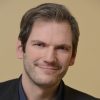Philipp Koehn, a professor of computer science, is recognized worldwide for his leading research in and applications for developing and understanding data-driven methods to solve long-standing, real-world challenges of machine translation and machine learning.
Today’s deluge of digital information is both a product of and an engine for nearly every function of modern society. Koehn’s area of renowned expertise—machine translation, or translating text from one human language to another via computer—is vital to addressing the ever-expanding need for natural language processing and machine learning.
At the 2011 meeting of the Multilingual Europe Technology Alliance Network of Excellence, Koehn won first prize for Moses, his open-source toolkit for statistical machine translation. One of three finalists for the 2013 European Inventor Award, he won the International Association for Machine Translation’s Award of Honor in 2015. His additional contributions to the field—through refereed journals, panels, presentations, and web tutorials—are extensive. He has also given numerous invited talks and has appeared on CNN and other media outlets.
Koehn serves on the editorial boards for multiple journals, among them Artificial Intelligence Review and ACM Transactions on Asian and Low-Resource Language Information Processing. Koehn is a noted leader within the Association for Computational Linguistics (ACL), where he was the founding president of the Special Interest Group on Machine Translation and the former president of the Special Interest Group on Linguistic Data and Corpus-Based Approaches to Natural Language Processing. Koehn’s ACL leadership experience also includes co-chairing the association’s series of workshops and conferences on machine translation since 2005 and chairing several ACL Workshops on Statistical Machine Translation. He was also named an ACL Fellow in 2024. Koehn has also chaired the Machine Translation Marathon and has co-chaired the Machine Translation Marathon in the Americas.
He received a master’s degree (1994) from the University of Tennessee, a diplom from the Universität Erlangen-Nürnberg (1997), and a doctorate from the University of Southern California (2003), all in computer science.



